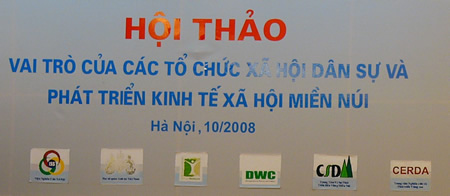Vietnam is recognized as one of the world's most biodiverse…

Workshop on the Role of Civil Society Organizations in Economic and Social Development in Mountainous Areas
“The role of civil society organizations in economic and social development in mountainous areas” workshop was organized October 21st, 2008 in Hanoi by the Vietnam Union of Science and Technology Associations (VUSTA), in collaboration with Institute for Social Research, Center for Promoting Development for Women and Children (DWC), Center for Sustainable Development in Mountainous Areas (CSDM), Centre of Research and Development in Upland Area (CERDA), and People and Nature Reconciliation (PanNature).

The objective of the workshop aims to enhance awareness and exchange views on the role of civil society organizations in socio-economic development at provincial level and support for ethnic minorities in mountainous areas. The workshop introduced an overview of civil society in Vietnam as well as mechanisms to help civil society organizations connect with other state agencies to contribute ideas, analysis and discussions on policies and laws relating to ethnic and development issues in mountainous areas.

In addition, CSDM, CERDA, DWC and PanNature also presented their viewpoints, development methodologies, and specific examples from field projects in order to reflect the practical lessons on socio-economic development in mountainous areas and raising awareness of local communities on development issues. Throughout these presentations, different approaches of participating CSOs became clear. DWC uses a right-based approach with participation of local communities and available resources. CERDA begins by identifying difficulties of local communities and consequently concentrates on appropriate solutions. CSDM carries out their approach through establishing and developing networks in local communities, such as performance – communication groups, traditional medicine practitioner groups, and indigenous knowledge conservation and development groups. PanNature introduced their specific view on access to natural resources after forest land allocation. The workshop ended with a round table discussion on formulating civil society organization networks, capacity of these organizations, as well as approaches for developing and operating successful networks on ethnic and mountainous issues. By Hai Van



